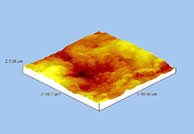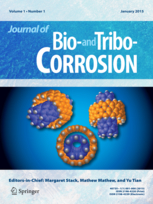|
What
we do in this group....
Tribology is a derivation of the Greek
word "Tribos" which means "rubbing".
The activities of this research group cover areas where:
wear occurs due to surfaces which rub against
each other (sliding wear)
particles may be entrained in the contact
(3 body wear)
particles may cause impact on the surface
(erosion) or gouge out the surface (abrasion)
and where wear occurs due to formation
and collapse of bubbles of air at high pressures (cavitation).

Atomic force micrograph of the eroded
face of a superlattice PVD coating
In particular, their interactions with
corrosion (tribo-corrosion) are being examined and the rationale
for defining such interactions-so important for Engineers
charged with controlling such processes-is being studied.
Significant progress has been made in the past 10 years
in the UK in the study of tribological phenomena, particularly
in the areas of erosion-corrosion and abrasion and the development
of engineering "maps" of such processes.
This group is concerned with developing
maps for particulate
erosion, micro-abrasion, sliding wear and cavitation, in
corrosive environments, both at room and at elevated temperatures.
It has an established track record in mapping slurry erosion-corrosion
of coated and uncoated materials, solid particle erosion
of MMCs at elevated temperatures, and for erosion-corrosion
of new generation "superlattice" coatings. These
maps may indicate a wide range of phenomena i.e. the mechanism
of wear, the extent of wastage and interaction between the
processes, all components of tackling the complex area of
Tribology from the perspective of the Mechanical Engineer.
Over 200 publications (123 journal articles) have
been generated based on this work to date.
Publication pre-prints are available on Strathprints, the University institutional repository.

The Journal of Bio-and Tribo-Corrosion (1st issue March 2015) , the first journal in the subject, has been founded by group members.
The group is home to the International network
on Tribo-Corrosion, TrICorr-Net, which was funded originally by EPSRC, UK.
The group is pleased to announce a £1.01 M 3year sponsorship from EPSRC, for a Tribology and Tribo-Corrosion research related project to Marine Energy (Tidal Energy).
ReC-ASM started in June 2013 and is led from Strathclyde.The consortium involves two groups from the University of Strathclyde, TriboS and ESRU, the Advanced Materials group Newcastle University, nCATs and the Energy and Climate Change Division, University of Southampton. It was awarded as part of theSupergen Marine Grant Challange programme.
TriboS hosted the 4th International Conference on Tribo-Corrosion, 9-11 April 2014, in Strathclyde and it co-hosted the 5th International Conference on Tribo-Corrosion, Tribo-Corrosion V, in Hyderabad, India, 12-13 December, 2016.
The TriboS group in 2017 is very pleased to be involved in two major grants in Tribology of Renewable Energy Devices with the EU and EPSRC. The launch of SPIRE 2 (6.7 m euros) was in Belfast on October 27th 2017. TriboS with the CDT in Wind Energy will be working with SPIRE 2 colleagues in University of Ulster, Queens University and Dundalk Institute of Technology as part of this collaboration which on the Glasgow side involves 5PhDs and 1 PDRA researchers
The TriboS group is also collaborating in the EPSRC CAMREG (£2.1 m) project with Edinburgh and Cranfield Universities with a specific focus on tidal and wind turbine Tribology and Corrosion issues.
|